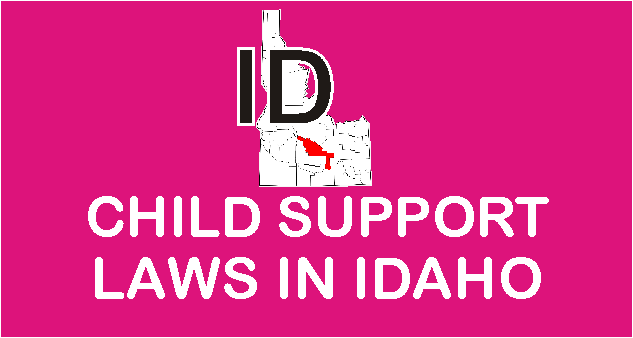
Child support is a legal obligation that is established in Idaho to ensure that both parents share the economic benefits of caring for their children, even after a divorce. The main objective of child support laws in Idaho is to provide the same amount of care for children as if the parents were still married.
The laws governing child support in Idaho are different from that of other states. ID child support law sets how much the child maintenance should be, and the duration of such payments, plus it seeks to guide parents in exceptional cases such as deviation, support for disabled children, and retroactive support.
What are ID Child Support Laws?
The fundamental tenets on which Idaho’s child support regulations are built upon these four principles:
- Legally, both parents are obligated to provide for their children, and that obligation should be distributed in accordance with each parent’s income.
- When allocating wealth, the demands of the children come before those of the parents or creditors.
- The custodial parent’s gender should not be taken into account for determining support obligations.
- There is a general assumption that each parent should contribute at a minimum of $50 per month per child because it is uncommon for a parent’s child support obligation to be set at $0.
The “Income Shares Model” is used in Idaho to determine the amount of child support due. The goal is to calculate how much assistance the kids would have gotten if the marriage hadn’t ended in divorce. The parents then split this support payment according to their individual wages. The following forms can be used to perform these calculations:
- Affidavit Verifying Income
- Shared or Split Custody Child Support Worksheet
- Standard Custody Child Support Worksheet
Factors Considered for Child Support Orders
The following factors will be considered by the court when determining whether Idaho Family Code applies:
- The age of the child and needs; the parents’ ability to assist
- Financial resources available to the child
- For a set period of time, you have custody and access to a child.
- An increase or decrease in the obligee’s earnings or income due to the obligee’s property and assets
- Childcare expenses incurred by either parent in order to keep a job
- any other children under the care of either party
- Any other children under the care of either party
- What kind of alimony or spousal maintenance is being paid or received;
- Obligor or obligee receives an automobile, house, or other benefits from his or her employer or business entity.
- The parties or the child’s special education, health care, or other expenses
- The cost of traveling to obtain custody of and access to a child.
- Cash flow from any estate and assets, including real estate, personal property, and business property, can be positive or negative.
How is Child Maintenance Calculated In Idaho?

Learn How Child Maintenance Calculated In Idaho
Idaho follows the “Income Shares Model” for determining child support obligations. This model calculates the amount of money parents would spend on their children if the family were still intact and divides the amount between each parent based on their income.
A parent’s income percentage affects how much they pay or receive. Your share of the combined parental income affects how much you pay or receive.
Which amount of parenting time is applicable also has an impact on payments. Due to a “shared” (roughly equal) care arrangement, payments might be lower.
Idaho follows the Income Shares Model, which calculates child support based on the combined gross income of both parents and the number of children. The Table of Basic Child Support Rates provides an estimate of the amount of child support that should be paid based on the parent’s combined income and the number of children.
Payments are based on both the number of children and the parents’ joint incomes. Payments are typically higher when there are more children or a higher combined income.
Understanding the ID Child Support Guidelines
Idaho’s Child Support Guidelines include a Table of Basic Child Support Rates, which shows the total support both parents must pay based on their combined guideline incomes and the number of children they have together. The guideline income is calculated by taking into account the parent’s gross income, including wages, commissions, and self-employment earnings, among others.
Assigning the Child Support Obligation
The total child support obligation is divided between each parent based on their respective income. For instance, if parent A earns $9,000 a month and parent B earns $5,000 a month, parent A would be responsible for 70% of the total support obligation (9,000 divided by 10,000) and parent B for 30% (5,000 divided by 10,000).
Calculating Child Support in Idaho
Determining an accurate child support figure requires multiple steps and a thorough understanding of the complex guidelines. The Idaho Supreme Court’s Court Assistance Office provides an Affidavit Verifying Income (CAO FL 1-11) and either a Standard Custody Child Support Worksheet (CAO FL 1-13) or a Shared or Split Custody Worksheet (CAO FL 1-12) to help estimate the amount of child support a court would likely order in a case. If the calculations and forms prove challenging, it’s recommended to seek help from an attorney.
Idaho Child Support Calculator
While a child support calculator can be used to estimate child support, it is not a guarantee of the final amount of child maintenance that the judge will order. A child support worksheet is a form used by the ID courts (or negotiating spouses) to approximate the basic child support obligation of the parents.
Regardless of which approach you use, spouses can decide on a child support sum and amend the worksheet accordingly to ensure it accurately reflects their agreement. Both establish a presumption duty to pay child support.
The final decision on the amount of child support is made by the administrative law judge, administrator, or court.
Gross Income Included in Calculating Child Maintenance

How to determine Net Income for ID child support
For child support calculation purposes, gross income includes:
- all wages and salary, including commissions, military pay, tips, overtime, and bonuses
- self-employment income
- interest and dividends
- net rental income from property the parent owns
Even jobless parents are likely to have some sources of income, like:
- severance pay
- unemployment benefits
- retirement benefits
- veterans’ benefits
- disability benefits, or
- workers’ compensation awards.
An ID family court judge may also allocate an income value to parents who do not currently have income-earning employment (like a second house). If a jobless parent inherits assets that can be sold, for instance, the judge may include the property’s market value as a part of such parent’s income.
Where parents willfully go unemployed or underemployed in order to avoid paying child support, judges may infer (assign) income based on what they are supposed to be earning.
Online Payment for CSS and Other Forms
CSS provides several forms related to child support, including a Modification Request form, a Medical Insurance Information form, and a Direct Deposit Enrollment form. Online payment for CSS is available for parents who want to pay their child support obligation electronically.
Steps to Collect Child Support in Idaho

Steps to Collect Child Support in Idaho
Getting a child support order in place is only half the struggle in Idaho. You’ll also have to collect the money itself. A noncustodial parent is responsible for paying the full amount of child maintenance per month as imposed by the court. Here are the steps for getting child support in ID.
1. Open a Child Support Case
Complete a child support application with your local child support agency/office
2. Locate the Other Parent
To begin the child maintenance procedure in ID, the child support services (CSS) office will use the information provided by the applying parent, as well as information gathered from other sources, to try to locate the other parent.
3. Establish Parentage
It’s critical to establish a legitimate relationship with the child when the other parent has been located. The state will assist you in locating sufficient means. Parents can choose to acknowledge their parentage voluntarily or organize a genetic screening.
4. Establish a Child Support Order
An Idaho child support order specifies how much the other parent should pay and includes details such as the payment schedule and provisions for the child’s health insurance.
5. Set Up Payment
Deducting child maintenance from a parent’s paycheck and transferring the money to the other parent or guardian is the most typical method of payment. It’s a simple way to make and track child support payments.
6. Enforce the Support Order
Your ID child support services will enforce the child support order if the noncustodial parent does not pay the full amount or does not pay any. Exposing overdue child support payments to credit bureaus, intercepting income tax refunds, and Withholding child maintenance from unemployment or worker’s compensation benefits are examples of other enforcement measures.
7. Review the Order
Three years after the order is issued, either parent can request their local child support office to revise it. They can ask for a reassessment sooner than three years if a parent’s situation has changed significantly, such as loss of employment or imprisonment.
Modification or Termination of Child Support
Child support orders can be modified or terminated if there is a significant change in circumstances, such as a change in income or the needs of the child. High school students are typically expected to provide their own support, and child support will end when the child turns 18 years old or graduates from high school, whichever comes later.
Steps to Modify or Terminate Child Support in ID
- Fill out the Petition for Child Support Modification
Also, attach the following:
– Affidavit Verifying Income
– Shared or Split Custody Worksheet or
– Standard Child Support Worksheet - Serve the petition to the other parent
– Acknowledgement of Service
– Affidavit of Service with Orders
Service by Publication (if you cannot find the other parent) - Responding to a Modification
– File a Response to a Modification Petition
– Disclose the required information in your response - Finalizing a Modification (Let the court know that the other party was served – may respond within the mandatory 21 days or both parties are in agreement)
A parent must show that there’s been a substantial change in circumstances in order to alter child support. An Idaho court may consider an alteration if:
- a parent’s employment has been lost,
- migrated to another country,
- Alternatively, if the custody agreement has changed.
Retroactive Child Support Arrears in ID
Withholding order is the enforcement measure that is most frequently used. In Idaho. Automatic income withholding is required for all child support orders. In other words, automatic withholding kicks in if the paying parent is one month behind and the money is taken out of their paycheck.
The courts and CSS may also take any of the following actions in addition to income withholding:
- garnish the bank accounts of the paying parent.
- withhold any state and federal tax returns due to the paying parent.
- withhold a portion of some federal benefits; however, veterans’ disability benefits, need-based aid (such as SSI), federal student loans, and certain Social Security benefits are not included.
- if delayed payments reach $2000, prepare for the suspension of the parent’s driver’s license, fishing, and game license, and any professional or vocational licenses.
- place a lien on a paying parent’s home or property
- intercept Retirement advantages under PERSI (Public Employee Retirement System of Idaho)
- send parents who owe money to the U.S. State Department, which will refuse or cancel their passports, if they have more than $2500.
- start contempt proceedings, in which the paying parent is required to attend court and provide justification for the parent’s violation of a valid court order; Contempt is a serious offense that carries fines and maybe jail time
- Report unpaid child support balances to the credit reporting agencies.
- for past-due child care, child support, and medical support payments, seek a court to sign and enter a “judgment”; a judgment has a terrible impact on a parent’s credit scores and empowers the government to pursue numerous intrusive procedures to collect on the judgment
- send a case involving unpaid child support to the U.S. Attorney for possible federal prosecution, albeit this rarely happens.
How to Enforce Child support payments in ID
A parent or caregiver may get in touch with the Department of Health and Welfare Child Support Services and submit an application to have child support obligations in Idaho enforced.
If you feel the arrears are being demanded wrongly, you can learn how to get child support arrears dismissed HERE.
Is Medical Health Insurance Part of Child Support in Idaho?

Medical Health Insurance and Child Support in Idaho
Yes, in addition to the amount of support determined by the guidelines in Idaho, the parents will be responsible for the child’s health and dental insurance.
Whereas the noncustodial parent is presumed to provide coverage, this can readily be transferred to the other parent if it makes good sense.
For instance, suppose the custodial parent’s employer offers healthcare insurance for the dependent but the noncustodial parent does not.
How to Check your Child Support Payment History in ID

How to Check Child Support Payment History in ID
When there are disagreements between the parents and a need to confirm how much money is owed, child support payment records are extremely beneficial. The process is managed by the Idaho Child Support Services (CSS).
Child Support Services (CSS) in Idaho
Child Support Services (CSS) is a division of the Idaho Department of Health and Welfare that handles all child support cases in the state. The CSS is responsible for enforcing child support payments, ensuring that medical support is provided, and modifying child support orders when necessary.
Contact the Idaho Child Support Services (CSS)
Address: 1120 W Ironwood Dr, Coeur d’Alene,
ID 83814,
United States
Phone: +1 800-356-9868
Website
Click Here for complete information on how to check child support history in ID.
Is Child Support Tax Deductible in Idaho?
NO. In Idaho, child support payments are neither taxable to the recipient nor tax-deductible by the payer as stated by the IRS. Don’t include child support payments when calculating your gross income to see whether you have to file a tax return.
However, either parent may be eligible for a dependency exemption per child. If the parents can’t agree on who receives the exemption, the judge will set out the terms in a court order.

Understanding Custody Rights of a Child in Idaho
Getting a Skilled Idaho Child Support Attorney
If you need to fight your child maintenance cause in ID with confidence, then you’ll need attorneys that are both empathetic and strong.
Luckily, we have compiled a database of these expert child support lawyers and made them available for the convenience of our members. You can reach them at the click of a button for legal advice and representation on child maintenance.
Click Here to Get our Free Idaho Alimony recommendation.
Resources for Child Support in Idaho
If you have questions or need assistance with child support in Idaho, you can contact the Idaho Supreme Court’s Court Assistance Office or an attorney. The CSS website (http://healthandwelfare.idaho.gov) also provides valuable information about child support services, how to apply for CSS, and the Idaho child support guidelines.
Idaho Resource
- Idaho Child Adoption Guidelines
- Idaho Childcare Guidelines
- Idaho Child Custody and Visitation Guidelines
- Idaho Child Support Guidelines
- Idaho Divorce Guidelines
- Idaho Marital Property Guidelines
- Idaho Spousal Support Guidelines
- How to Check Idaho Child Support Payment History
Child Support Laws in all 50 States
A - Alabama | Alaska | Arizona | Arkansas
C - California | Colorado | Connecticut
D-H - Delaware | Florida | Georgia | Hawaii
I - Idaho | Illinois | Indiana | Iowa
K-L - Kansas | Kentucky | Louisiana
M - Maine | Maryland | Massachusetts | Michigan | Minnesota | Mississippi | Missouri | Montana
N - Nebraska | Nevada | New Hampshire | New Jersey | New Mexico | New York | North Carolina | North Dakota
O - Ohio | Oklahoma | Oregon
P-S - Pennsylvania | Rhode Island | South Carolina | South Dakota
T-U - Tennessee | Texas | Utah
V-W - Vermont | Virginia | Washington DC | Washington State | West Virginia | Wisconsin | Wyoming




